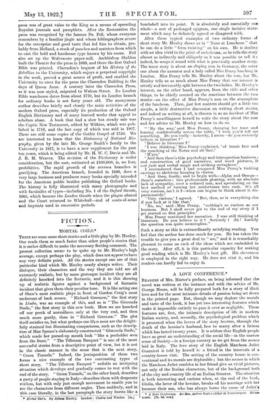FICTION.
MORTAL COILS.* TrrEsE are some more short stories and a little play by Mr. Huxley. One reads them so much faster than other people's stories that it is rather difficult to make the necessary fleeting comment. The present collection seems to be quite up to Mr. Huxley's high average, except perhaps the play, which does not appear to have any very definite point. All the stories except one are of that particular kind which Mr. Huxley nearly always writes. Their dialogue, their characters and the way they are told are all extremely realistic, but by some grotesque incident they are all definitely knocked into the fantastic, and it is this showing up of realistic figures against a background of fantastic incident that gives them their peculiar tone. It is like acting one of Shaw's most realistic plays in front of Gordon Craig's most undreamt-of back scenes. " Richard Greenow," the first story in Limbo, was an example of this, and so is " The Gioconda Smile," the first story in this new book. Here we are knocked off our perch of normalness only at the very end, and then much more gently, than in " Richard Greenow." The plot
itself satisfies us, but what perhaps one most are the delight. fully strained but illuminating comparisons, such as the descrip- tion of Miss Spence's elaborately-constructed " Gioconda Smile," which made her pursed-up mouth look " like a penholder seen from the front." " The Tillotson Banquet " is one of the most successful stories from a descriptive point of view, but it is not in the classic manner in the sense that is the next story, " Green Tunnels." Indeed, the juxtaposition of these two forms a nice example of the two contrasting types of short story. " The Tillotson Banquet " unfolds an intriguing situation which develops and gradually comes to rest with the end of the story. " Green Tunnels," on the other hand, describes a party of people staying in Italy—describes them with desperate realism, but with only just enough movement to enable you to see the characters from different angles. Then suddenly, and in this case literally, in the last paragraph the story bursts like a . • Mortal Co Us. By eldest' Huxley. London : Chatto and WIndue. Raj
bombshell into its point. It is absolutely and essentially one whole—a sort. of prolonged epigram, one single incisive state- ment which may be definitely agreed or disagreed with.
After these typical examples of two ordinary forms of short story Mr. Huxley shows us in " Nuns at Luncheon " that he can do a little "form twisting" on his own. He is dealing with an idea vivid to the point of melodrama, so he tells the story almost as indirectly and obliquely as it was possible to tell it : indeed, he wraps it round with what is practically another story.
The inner story is about an eloping nun in Germany, the outer
one about the narrator and a lady called Miss Penny lunching in London. Miss Penny tells Mr. Huxley about the nun, but Mr.
Huxley tells us so much about Miss Penny that our interest is utterly and irrevocably split between the two ladies. Mr. Huxley's interest, on the other hand, appears, from the title and other things, to be chiefly centred on the reactions between the two stories—on the effect of Miss Penny's nun on the atmosphere of the luncheon. Then, just lest matters should get a little too simple, a little destructive discussion on writing short stories, and indeed on writing at all, is thrown in as an incident of Miss Penny's unwillingness herself to write the story about the nun and her advice to Mr. Huxley on how to do so.
" By the way,' said Miss Penny, changing her tone and leaning confidentially across the table, I wish you'd tell me something. Do you really—honestly, I mean—do you seriously believe in literature ? '
Believe in literature 1'
I was thinking,' Miss Penny explained, of ironic fate and the quacking of the Noma and all that.'
M'yos.'
And then there's this psychology and introspection business ; and construction of good narrative, and word pictures, le mot juste and verbal magic and striking metaphors.
I remembered that I had compared Miss Penny's tinkling earrings to skeletons hanging in chains. And then, finally, and to begin with—Alpha and Omega— there's ourselves : two professionals gloating, with an absolute lack of sympathy, over a seduced nun, and speculating on the best method of turning her misfortunes into cash. It's all very curious, isn't it 1—when one begins to think about it dis- passionately.' Very curious,' I agreed. But, then, so is everything else if you look at it like that.'
No, no,' said • Miss Penny, ' nothing's so curious as our business. But I shall never get to the end of my story if I get started on first principles.' Miss Penny continued her narrative. I was still thinking of literature. Do you believe in it ? Seriously ? Ah ! Luckily the question was quite meaningless."
Such a story as this is extraordinarily satisfying reading. You feel that the author has done much for you. He has taken the
trouble to give you a great deal to " see," and it is remarkably pleasant to come on each of the ideas which aro embedded in the story. After all, it is this particular capacity for making good reading which is Mr. Huxley's best gift. His cleverness is employed in the right way. He does not stint it, and his readers can hardly fail to enjoy it.


































 Previous page
Previous page